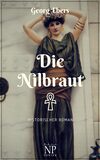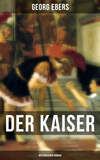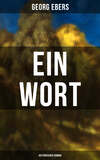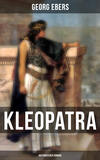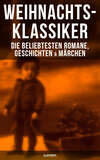Kitabı oku: «Margery (Gred): A Tale Of Old Nuremberg. Complete», sayfa 15
Still, as heretofore, many were obedient to Ann’s lightest sign, but never till now had I seen her proud of her power and so eager to use it. Now and again she would turn to Herdegen with some light word and a free demeanor, yet he, it was plain, would not vouchsafe to take his seat before her with the rest.
Nay, meseemed that he and Ursula had no part with us; inasmuch as that she was arrayed in velvet and rich brocade, and a bower, as it were, of yellow and purple ostrich plumes curled above her riding-hat.
Herdegen likewise was in brave array, after the fashion of the French, and a bunch of tall feathers stood up above his head, being held in a silken fillet that bound his hair. His cross-belt was set with gems and hung with little bells, tinkling as he moved and jarring with our song; and in this hot summer-tide it could not have been for his easement that he wore the tagged lappets, which fell, a hand-breadth deep, from his shoulders over the sleeves of his velvet tunic.
The more gleefully we sang and the more it was made plain that we, to all seeming, were only to obey the wishes of Ann and of his highness the duke, the less could my brother refrain himself to hide his ill-pleasure; and when presently the Junker besought Ann that she would sing “Tanderadei,” which she very readily did, Herdegen could bear no more; he asked the Italian to lend him his mandoline, and struck the strings as though merely for his own good pleasure. Whereupon Ann turned to him and courteously entreated him for a song, and he asking her which song she would have, she hastily replied: “Your old ditties are already known to me, Junker Schopper; and, to judge by your seeming, you now take no pleasure save in French music. Let us then hear somewhat of the latest Paris fashion.”
To this he replied, however: “Here, in my own land, I would like better to sing in my own tongue, by your gracious leave, fair mistress.”
Then bowing to Ursula and to me, without even casting a glance at Ann, he went on to say: “And seeing that methinks you love madrigals, I will sing a Franconian ditty after the Junker’s Brandenburg ballad.”
He boldly struck the strings, and the little birds, which by this time had gone to rest in the linden-tree, again uplifted their little heads, and all that had ears and soul, near and far, Ann not the least, hearkened as he began with his clear voice and noble skill.
“To all this goodly company
I sing as best I may,
A madrigal of ladies fair
And damsels soote and gay.
Through many countries great and small
I roam, and ladies fair I see
Many! but fairest of them all
The maidens of my own countree.
The maidens of Franconia
I ever love to meet,
They dwell in fond remembrance
A vision ever sweet.
Of maids they are the crown and pearl!
And if I might but spin them
I would make the spindle whirl!”
My lord duke clapped hearty praise of the singer, and we all did the same; all save Junker Henning, who had not failed to mark that Herdegen had striven to out-do his modest warble, and likewise the ardent eyes he turned on the lady of his choice. Hence he moved not. Ann clapped her hands but lightly, sat looking into her lap, and for some time could say not a word; indeed, if she had trusted herself to speak the game would of a certainty have been lost.
The knight of Eberstein it was, who ere long, albeit unwittingly, came to her aid; he challenged Ursula to give us a song in thanks to Junker Herdegen’s praise of the maids of Franconia.
The damsel thought to do somewhat fine by making choice, instead of a German song, of a French lay by the Sieur de Machault “J’aim la flour,” which was well known to all of us by reason that she had learnt it from old Veit Spiesz, Ann’s grandfather; and she had no need to fear to uplift her voice, inasmuch as it was strong and as clear as a bell. But she sang over-loud and with a mode of speech which made Herdegen smile, and I can see her now as she stood upright in her fine yellow and purple garb, singing the light-tripping ditty,
“J’aim la flour
De valour
Sans falour
Et l’aour
Nuit et jour.”
with all her might, as though stirring them to battle. The folly of so wrong-headed a fashion of singing such words was plain to Ann, in whose very blood, as it were, lay all that was most choice in musical feeling, and Herdegen’s smile brought her a calmer mind again. When, presently, Ursula, believing that she had done somewhat marvellous, boldly turned upon Ann and besought her to sing—as though there had never been a breach between the twain—Ann refused, as not caring but yet firm in her mind. Then the Duke, who was even yet a fine singer and bore in mind how Ursula had demeaned herself towards Ann at the great dance, desired to have the lute and sang the song as follows:
“Behold a lady sweet and fair
In simple dress,
But right well clothed upon is she
With seemliness.
By her do flowers seem less bright,
And she is such a glorious sight
As, on May morns, the golden sun which lights up hill and lea—
But froward maids delight us not, with all their bravery.”
And he sang the little verse to Ann as though it were in her praise, till at the last line, which fell from his lips as it were in scorn, he cast a reproving glance at Ursula, and many an one might see and feel how well the song befitted one and the other of the hostile damsels.
Yet was it hard to guess what Ursula was thinking of all this; she thanked the Duke right freely for his fine song which held up the mirror to all froward ladies. At the same time she looked steadfastly at Ann, and led both Herdegen and the Knight of Eberstein to talk with herself; yet how often all the time did my brother cast his eyes at his heart’s beloved, whom he had betrayed.
As for myself, I can call to mind little enough of all that was said, for the most part concerning the flowers and trees in the garden. Only Ann and my brother dwell in my memory, each feigning neither to see nor to hear the other, while covertly each had not eyes nor ears for any other. Yes, and I mind me how my brother’s unrest and distress so filled me now with joy and now with pity, that I longed to cry out to the Junker that this was a base trick they were playing on him, inasmuch as Ann poured oil and more oil on the flame of his love.
And there stood old Tetzel and his daughter, and it was plain to see that they deemed that they had Herdegen safe in their toils; nay, it seemed likely enough that he had done his uncle’s bidding and was already betrothed to her. Howbeit this strange lover had up to that moment cast not one loving look on his lady love.
What should come of it all? How could I ever find peace and comfort in so perverse a world, and amid this feigning which had turned upside down all that heretofore had seemed upright? Whichever way I turned there were things which I did not crave to see, and the saints know full well that I gazed not round about me; nay, that my eyes were set on two small specks plain to be seen—the two drops of blood which had fallen from Ann’s finger, and which were now two dark, round spots on her white gown; and, as it grew dusk, meseemed they waxed blacker and greater.
At length, to my great joy, my lord the Duke rose and made as though he were departing; whereupon the false image vanished, and I beheld Ann giving her hand with a witching smile to Junker Henning, that he might help her to rise.
Supper was waiting for us at the Forest lodge. My Aunt Jacoba placed the Duke in the seat of honor at her right hand, with Ann and Junker Henning next to him. Herdegen she sent to the other end of the table to sit near his uncle, and Ursula far from him near the middle; to the end that it might be clearly seen that she knew naught of any alliance between that damsel and her nephew.
During that meal my squire had little cause to be pleased with his lady. The foolish sport begun in the garden was yet carried on and I liked it not, no more than my brother’s French bravery; at table he appeared in a long red and blue garment of costly silken stuff, with a cord round the middle instead of a belt, so that it was for all the world like the loose gown which was worn by our Magister and by many a worthy citizen when taking his easement in his own home.
Besides all this, my heart was heavy with longing for my own true love, and my eyes filled with tears a many times, also I thanked the Saints with all my heart when at length my aunt left the table.
When we were outside she asked me privily whether Ann had rightly played her part; to which I answered “Only too well.”
Herdegen, also, so soon as he had bid good night to Ursula, led me aside and desired to know what had come upon Ann. To this I hastily replied that of a surety he could not care to know, inasmuch as he had broken troth with her. Thereat he was vexed and answered that as matters were, so might they remain; but that he was somewhat amazed to mark how lightly she had got over that which had spoiled many a day and night for him.
Then I asked him whether he had in truth rather have found her in woe and grief, and would fain have had her young days saddened for love of him? He broke in suddenly, declaring that he knew full well that he had no right to hinder her in any matter, but that one thing he could not bear, and that was that she, whom he had revered as a saint, should now demean herself no more nobly nor otherwise than any other maid might. On this I asked him wherefor he had denied his saint; nay, for the sake—as it would seem—of a maid who was, for sure, the worldliest of us all. And, to end, I boldly enquired of him how matters stood betwixt him and Ursula; but all the answer I got was that first he must know whether Ann were in earnest with the Junker. On this I said in mockery that he would do well to seek out the truth of that matter to the very bottom; and running up the steps by which we were standing, I kissed my hand to him from the first turning and wished him a good night’s rest.
Up in our chamber I found Ann greatly disturbed.
She, who was commonly so calm, was walking up and down the narrow space without pause or ceasing; and seeing how sorely her fears and her conscience were distressing her, pity compelled me to forego my intent of not giving her any hopes; I revealed to her that I had discovered that my Herdegen’s heart was yet hers in spite of Ursula.
This comforted her somewhat; but yet could it not restore her peace of mind. Meseemed that the ruthless work she had done that day had but now come home to her; she could not refrain herself from tears when she confessed that Herdegen had privily besought her to grant him brief speech with her, and that she had brought herself to refuse him.
All this was told in a whisper; only a thin wall of wood parted Ursula’s chamber from ours. As yet there was no hope of sleep, inasmuch as that the noise made, by the gentlemen at their carouse came up loud and clear through the open window and, the later it grew, the louder waxed Herdegen’s voice and the Junker’s, above all others. And I knew what hour the clocks must have told when my brother shouted louder than ever the old chorus:
“Bibit heres, bibit herus
Bibit miles, bibit clerus
Bibit ille, bibit illa
Bibit servus cum ancilla.
Bibit soror, bibit frater
Bibit anus, bibit mater
Bibit ista, bibit ille:
Bibunt centem, bibunt milee.”
[The heir drinks, the owner drinks,
The soldier and the clerk,
He drinks, she drinks,
The servant and the wench.
The sister drinks and eke the brother,
The grand dam and the gaffer,
This one drinks, that one drinks,
A hundred drink—a thousand!]
Nor was this the end. The Latin tongue of this song may peradventure have roused Junker Henning to make a display of learning on his part, and in a voice which had won no mellowness from the stout Brandenburg ale—which is yclept “Death and murder”—or from the fiery Hippocras he had been drinking he carolled forth the wanton verse:
“Per transivit clericus
[Beneath the greenwood shade;]
Invenit ibi stantent,
[A fair and pleasant maid;]
Salve mi puella,
[Hail thou sweetest she;]
Dico tibi vere
[Thou my love shalt be!]”
The rest of the song was not to be understood whereas Herdegen likewise sang at the same time, as though he would fain silence the other:
“Fair Lady, oh, my Lady!
I would I were with thee,
But two deep rolling rivers
Flow down ‘twixt thee and me.”
And as Herdegen sang the last lines:
“But time may change, my Lady,
And joy may yet be mine,
And sorrow turn to gladness
My sweetest Elselein!”
I heard the Junker roar out “Annelein;” and thereupon a great tumult, and my Uncle Conrad’s voice, and then again much turmoil and moving of benches till all was silence.
Even then sleep visited us not, and that which had been doing below was as great a distress to me as my fears for my lover. That Ann likewise never closed an eye is beyond all doubt, for when the riot beneath us waxed so loud she wailed in grief: “Oh, merciful Virgin!” or “How shall all this end?” again and again.
Nay, nor did Ursula sleep; and through the boarded wall I could not fail to hear well-nigh every word of the prayers in which she entreated her patron saint, beseeching her fervently to grant her to be loved by Herdegen, whose heart from his youth up had by right been hers alone, and invoking ruin on the false wench who had dared to rob her of that treasure.
I was right frightened to hear this and, in truth, for the first time I felt honest pity for Ursula.
BOOK 2
CHAPTER I
The Imperial Diet in Nuremberg!—the Imperial Advent!
The next day their Majesties were to enter into the town, and with them my Hans.
A messenger had brought the tidings, and now we must use all diligence; Ann and Elsa and I, with one and twenty more, had been chosen among all the daughters of the worshipful gentlemen of the council, to go forth to greet the Emperor and Empress with flowers and a discourse. This Ursula was to speak, by reason that she was mistress of all such arts; likewise was she by birth the chiefest of us all, inasmuch as that her late departed mother was daughter to the great Reynmar, lord of Sulzbach. Nor need Ann and I seek far for the flowers. The Hallers’ garden had not its like in all Nuremberg, and my dear parents-in-law had promised that we should pluck all we needed for our posies.
Or ever I mounted my horse, I had tidings that Herdegen and Junker Henning had, last evening, come to bitter strife, nay, well-nigh to bloodshed; for that when my brother had sung the ditty in praise of one Elselein and the other had called upon him to put in the name of Ann, Herdegen had cried: “An if you mean red-haired Ann, the tapster wench at the Blue Pike, well and good!” Whereupon the Junker sprang up and flung the tankard he had just emptied at Herdegen’s head. Herdegen had nimbly ducked, and had rushed on the drunken fellow sword in hand; but Duke Rumpold had put a word in, and by this morning Junker Henning seemed to have forgotten the matter. In Brandenburg, verily, such frays were common at the drinking-bouts of the lords and gentlemen, and by dawn all offence given over-night in their cups was wiped out of mind.
My brother lodged again at our grand-uncle’s, while the Junker dwelt at the Waldstromer’s townhouse. My Lord Duke found quarters at the Hallerhof, and his Highness the Prince Elector, and Archbishop Conrad of Mainz likewise lodged there, with a great following. Cousin Maud had made ready to welcome the Margrave of Baden and the Count von Henneberg under our roof. The upper floor of the Pernhart’s house was given up to his Eminence Cardinal Branda, the most steadfast friend at Rome of Master Ulman’s brother the bishop. His Holiness the Pope had sent that right-reverend prelate as his legate to the assembly, and he presently celebrated mass with great dignity in the presence of their Majesties and of the assembled lords and princes.
To this day my memory is right good in all ways; and of what followed on these events much is yet as clear and plain in my mind as though I saw and heard it all at this present time; albeit I, an old woman, would fain hide my face in my hands and weep thereat. For, notwithstanding there were certain hours in those days which brought me sweet love-making, and others of sheer mirth and vanity, yet is the spirit of man so tempered that, when great sorrow follows hard on the greatest joy it sufficeth to darken it wholly. And thus we may liken heaviness of heart to the chiming of bells, which hurts the ear if they sound over near, but at a distance make a sweet and devout music. Now, in sooth, inasmuch as I must make record of the deepest woe of my life, the brazen toll is a sad one, and the long-healed wounds ache afresh.
Those two months of the Imperial Diet! They lie behind me like distant hills. I can no more discern them apart, albeit certain landmarks, as it were, stand forth plainly to be seen, like the church-tower, the windmill, and the old oak on the ridge on the horizon.
How the night sped after our return from the forest and the morning next after—the 27th of July in the year of our Lord 1422—I can no longer call to mind; but I can see myself now as, the afternoon of that day, I set forth with Ann, attired in silk and lace—all white and new from head to foot, as it were for a wedding—to go to the open place between St. James’ Church and the German House, within the Spital Gate. Whichever way we looked, behold flowers, green garlands, hangings, pennons, and banners; it was as though all the gardens in Franconia had been stripped of their blossoms. Never had such a brave show been seen, and with every breath we drank in the odors of the leaves and flowers which were already withering in the July sunshine. A finer Saint Pantaloon’s day I never remember; the very sky seemed to share the city’s gladness and was fair to see, in spotless blue. A light wind assuaged the waxing heat, and helped the flags and banners to unfurl: Our fine churches were decked all over and about with garlands, boughs, and banners, and meseemed were like happy brides awaiting their marriage in holiday array. The market-place was a scene of high festival, the beautiful fountain was a mighty bower of flowers, the triumphal arches, methought, were such as the gods of wood and garden might have joined to raise. Every balcony was richly hung, and even the crested gables and the turrets on the roofs displayed some bravery. All, so far as eye could see, was motley-hued and spick and span for brightness. The tiniest pane in the topmost dormer-window glittered without a spot. The poorest were clad in costly finery; the patrician folk were in the dress of knights and nobles; every craftsman was arrayed as though he were a councillor, every squire like his lord. You would have weened that day that there were none but rich folk in Nuremberg. The maidens’ pearl chaplets gleamed in the sun, and the golden jewels in their fur bonnets; and what did their mothers care for the heat as they went to and fro to display the costly fur turbans which crowned their heads as it were with a glory of fur? How carefully had they dressed the little ones! They were to see the Emperor and Empress with their own eyes, and their Majesties might even, by good hap, see them!
Presently we saw the procession of the guilds with their devices and banners; never had they come forth in such goodly bravery. They were to form in ranks, on each side of the streets and the highway, a long space outside the gate.
At last it was nigh the hour when their Majesties should arrive. We maids had all assembled. Albeit we had agreed all to be clad in white, Ursula had decked her head-gear with Ostrich feathers of rose-pink and sky-blue; right costly plumes they were, but over many. Now would she look into her parchment scroll, and for us she had brief words and few. The nosegay which her servant in scarlet livery bore in his hand was a mighty fine one; and Akusch and a gardener’s boy presently came up with the posies culled for Ann and me in the Hallers’ garden. We, and many another maid, clasped our hands in sheer delight, but Ursula cast a look on them which might, if it could, have robbed the roses and Eastern lilies of their sweetness.
The Emperor, it was said, would keep to the hour fixed on; then all the bells began to ring. I knew them all well, and one I liked best of all; the Benedicta in Saint Sebalds Church, which had been cast by old Master Grunewald, Master Pernhart’s closest friend. Their brazen voices stirred my soul and heart, and presently the cannon in the citadel and on the wails rattled out a thundering welcome to the Emperor, rending the summer air. My heart beat higher and faster. But suddenly I meseemed that all the bravery of the town and the holiday weed of the folks, the chiming of bells and the roaring of cannon were not meant to do honor to the Emperor, but only to my one true love who was coming in his train.
All my thoughts and hopes were set on him. And when the town-pipers struck up with trumpets and kettledrums, bagpipes and horns, when the far-away muttering and roll of voices swelled to a roaring outcry and an uproarious shout, when from every mouth at every window the cry rose: “They are corning!”—yet did I not gaze at their Majesties, to whom the day and festival belonged, but only sought him who was mine—my own.
There they are! close before us.—The Emperor and his noble wife, Queen Barbara, the still goodly daughter of the great Hungarian Count of Cilly.
Aye! and he looks the man to rule six realms; worthy to stand at the head of the great German nation. He might be known among a thousand for an Emperor, and the son of an Emperor! How straight he sits in his saddle, how youthful yet is the fire in his eye, albeit he has past his fiftieth birthday! High spirit and contentment in his look; and meseems he has forgotten that he ever summoned the Diet to meet at Ratisbon and is entering the gates of Nuremberg against his will, by reason that the Electors and German princes have chosen to assemble there. His wife likewise is of noble mien, and she rides a white palfrey which, as she draws rein, strives to turn its pink nostrils to greet the bay horse on which her lord is mounted.
Yet do my eyes not linger long on the lordly pair; they wander down the long train of Knights wherein he is coming, though among the last. For a moment they rest on the stalwart forms of the Hungarian nobles, all blazing with jewels even to the harness of the steeds; and glance unheedingly at the Electors and Princes, the Dukes, Counts and Knights-all in velvet and silk, gold and silver; at the purple and scarlet of the prelates; at the solemn black with gold chains of the town councillors; on and beyond all the magnificent train which has come with his Majesty from Hungary or gone forth to meet him.
Hereupon Ursula steps forth to speak the address; but sooner may a man hear a cricket in a thunderstorm than a maid’s voice amid that pealing of bells and shouting and cries of welcome. Meseems verily as though the fluttering handkerchiefs, the flying pennons, and the caps waved in the air had found voice; and Ursula turns her head to this side and that as though seeking help.
Emperor Sigismund signs with his hand, and the two heralds who head the train uplift their trumpets with rich embroidered banners. A rattling blast procures silence: in a moment it is as though oil were poured on a surging sea. Men and guns are hushed; the only sounds to be heard are the brazen tongue of the bells, the whinnying of a horse, the dull mutter of men’s voices in the far-off lanes and alleys, and the clear voice of a young maid.
Ursula made her speech, her voice so loud at the last that it might have seemed that the honeyed verses were words of reproof. The imperial pair gave each other a glance expressing surprise rather than pleasure, and vouchsafed a few words of thanks to the speaker. His Majesty spoke in German; but in his Bohemian home and Hungarian Kingdom he had caught the trick of a sharper accent than ours.
A chamberlain now gave the signal, and we maidens all went forth towards our Sovereign lord and lady. Two and two—Tucher and Schilrstab—Groland and Stromer; and the sixth couple were Ann and I—Ann as the daughter of a member of the council—and my godfather it was, besides her sweet face, who had done most to get her chosen.
Noble youths clad as pages in velvet and silks had received the flowers offered by the damsels; but as Ann and I stood forth, the Emperor and Empress looked down on us. I could see that they gazed upon us graciously, and heard them speak together in a language I knew not; and Porro, the King’s fool—and I say the King’s, inasmuch as it was not till later that Sigismund was crowned Emperor at Rome, and by the same token it was at that time that my Hans’ brothers, Paul and Erhart, were dubbed Knights—Porro, who rode at his lord’s side on a piebald pony spotted black and yellow, cried out: “May we all be turned into drones, Nunkey, if the flowers which have given this town the name of the Bee-garden are not of the same kith and kin as these!”
And he pointed to us; whereupon the King asked him whether he meant the damsels or the posies. But the jester, rolling on his nag after a merry fashion, till the bells in his cap rang again, answered him: “Nay, Nunkey, would you tempt a Christian to walk on the ice? An if I say the damsels, I shall get into trouble by reason of your strict morality; but if I say the posies, I shall peril my poor soul’s health by a foul lie.”
“Then choose thee another shape,” quoth the Queen, “for I fear lest the bees should take thee for a stinging wasp, Porro.”
“True, by my troth,” said the fool, thinking. “Since Eve fell into sin, women’s counsel is often the best. You, Nunkey, shall be turned into a butterfly, and not into a drone, and grace the flowers as you flutter round them.”
And he waved his arms as they were wings and rode round about us on his pony with right merry demeanor, like a moth fluttering over us. Ann looked down, reddening for shame, and the blood rose to my cheeks likewise for maiden shyness; nevertheless I heard the King’s deep, outlandish tones, and his noble wife’s pleasant voice, and they lauded our posies and made enquiry as to our names, and straitly enjoined Ann and me not to fail of appearing at every dance and banquet; and I remember that we made answer with seemly modesty till the King’s grand-master came up and so ended our discourse.
And I fancy I can see the multitude coming on; the motley hues of velvet and silk, the housings and trappings of the horses, the bright sheen of polished metal, and the sparkle of cut gems dazzle my eyes, I ween, to this day. But on a sudden it all fades into dimness; the cries and voices, the bells, the neighing, the crash and clatter are silent—for he is come. He waves his hand, more goodly, more truly mine and dearer to my heart than ever. But not here do we truly meet again; that joy is to come later in his own garden.
That garden could already tell a tale of two happy human creatures, and of hours of the purest bliss ever vouchsafed to two young hearts; but what thereafter befell I remember as bright, hot, summer days, full of mirth and play-acting, of tourneys and courtly sports, of music and song, dancing and pleasuring. The gracious favor of the King and Queen and the presence of many princes ceased not to grace it, and went to our brain like heady wine. Things that had hitherto seemed impossible now came true. Out of sheer joy in those intoxicating pleasures, and for the sake of the manifold demands that came upon us in these over-busy days, we forgot those nearest and dearest to our hearts. Yet never was I given to self-seeking, neither before nor since that time.
Ann’s beguiling of the Junker, the homage paid to her by all, even the highest, Herdegen’s seething ire, his strivings to win back the favor of the maid he had slighted, his strange and various and high-handed demeanor, his shameless ways with Ursula, to whom he paid great court when my grand-uncle was present, albeit at other times he would cast dark glances at her as if she were a foe—all this glides past me as in a mist, and concerning me but little. Then, in the midst of this turmoil and magnificence, this love-making and royal grace, now and again meseemed I was suddenly alone and forlorn; even at the tourney or dance; nay, even when the King and Queen would vouchsafe to discourse with me, I would be filled with longing for peace and silent hours—notwithstanding that the mighty Sovereign himself took pleasure in questioning me and moving me to those quick replies whereof I never found any lack. Queen Barbara would many a time bid me to her chamber, and keep me with her for hours; sometimes would Ann also be bidden, and she bestowed on us both many costly jewels.
Then, no sooner had we quitted the castle, where their Majesties lodged, than we must think of our own noble guests; for Markgraf Bernhard of Baden, who was quartered on us, would often ask for me, and Cardinal Branda would desire Ann to attend him. The larger half of our days was given to arranging our persons, and while Cousin Maud and Susan would dress me I was already thinking of making ready the weed, the ribbons, and the feathers needed for the next day. My Hans was now a Knight. The same honor was promised to Herdegen—honor on honor, pleasure on pleasure, bravery and display! In the stead of our old sun twenty, meseemed, were blazing in the heavens. Many a time it was as though my breath came so lightly that I could float on air, and then again a nightmare load oppressed me. Even through the night, in my very dreams, the sounds of music and singing ceased not; but when I awoke the question would arise: “To what end is this?”



